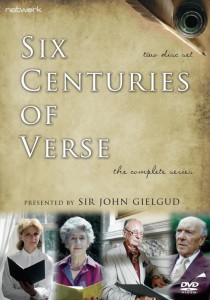Six Centuries of Verse
 It may have helped if the 2013 repackaging reflected the current waning of reference or deference to the British honours system. Subsequent to the original broadcast, numerous actors featured here became knights or dames. The foregrounding of this in promotional materials reinforces the sense of this series as a production which – while aimed at a general audience – presents poetry in a fashion so elitist that it borders on cultural assault.
It may have helped if the 2013 repackaging reflected the current waning of reference or deference to the British honours system. Subsequent to the original broadcast, numerous actors featured here became knights or dames. The foregrounding of this in promotional materials reinforces the sense of this series as a production which – while aimed at a general audience – presents poetry in a fashion so elitist that it borders on cultural assault.
Episodes begin with Gielgud in a private library, perusing leather-bound volumes. The performance locations rarely diversify beyond Chastleton House (Oxfordshire), Farnborough Hall (Warwickshire) and Beckley Park (Oxfordshire), though Wordsworth’s Dove Cottage features in the episode on the Cumbrian poet – whose democratic literary ideals in Lyrical Ballads receive less attention than his later life as a reactionary Poet Laureate. When, illustrating Robert Lowell’s verses, American scenes of carparks and construction sites are shown, the implication is that nothing comparably deprived exists in England.
There is little about Six Centuries of Verse that does not appear stiffly conservative. Successive Poet Laureates are referenced as if the role marks the summit of creative worth. Most recitals, filmed around cloisters and gardens of country houses, feature white men bellowing in Received Pronunciation. What is most problematic about Six Centuries of Verse is not the fact that poetry in English has been dominated by privileged white men; the problem is the critical oblivion to this fact throughout the series. Elizabeth Barrett Browning and Christina Rossetti are introduced respectively by reference to husband and brother. The final episode (‘Towards the Present: 1934-84’) mentions no female British poets. Shifting to America, it ignores Langston Hughes, Gwendolyn Brooks and Maya Angelou. Lowell’s ‘For the Union Dead’ (1960) – introduced with mention of the Black infantrymen ‘who fought under the command of their white officer’ – is the nearest Six Centuries of Verse comes to representing Black voices.
Despite the gigantic talents involved, this 1984 production can at best be described as archaically whimsical. Still, for anyone wanting escapist entertainment through falsely antiquated notions of poetry and society, this DVD is peerless. And there’s definitely plenty to discuss.
Dr James McGrath lectures in English and Media at Leeds Metropolitan University.
 Learning on Screen
Learning on Screen